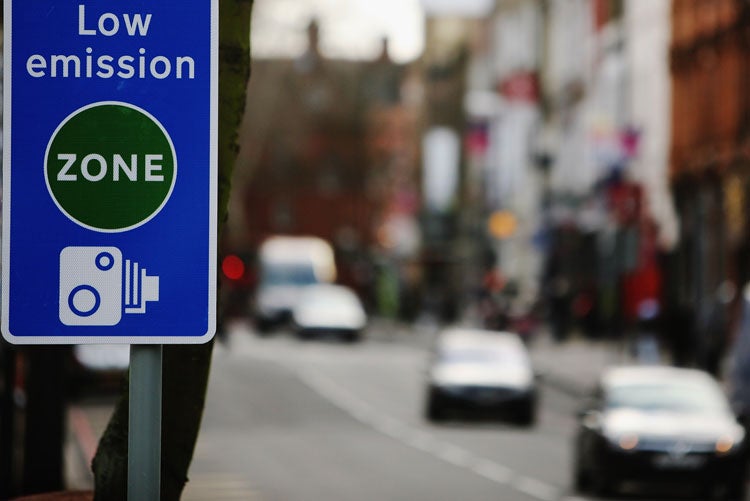Your support helps us to tell the story
From reproductive rights to climate change to Big Tech, The Independent is on the ground when the story is developing. Whether it's investigating the financials of Elon Musk's pro-Trump PAC or producing our latest documentary, 'The A Word', which shines a light on the American women fighting for reproductive rights, we know how important it is to parse out the facts from the messaging.
At such a critical moment in US history, we need reporters on the ground. Your donation allows us to keep sending journalists to speak to both sides of the story.
The Independent is trusted by Americans across the entire political spectrum. And unlike many other quality news outlets, we choose not to lock Americans out of our reporting and analysis with paywalls. We believe quality journalism should be available to everyone, paid for by those who can afford it.
Your support makes all the difference.London mayor Ken Livingstone today launched a controversial new strategy to tackle air pollution in the capital.
From today operators of heavy lorries that fail to meet low emission targets will be charged £200 to drive into Greater London.
The capital's low emission zone (LEZ) is aimed at cutting harmful pollution, which makes London one of the most polluted capitals in Western Europe.
Covering most of Greater London - unlike the £8 daily congestion charge, which only applies to the centre - the LEZ targets all diesel-engined lorries weighing more than 12 tonnes.
Transport for London said there are 23,000 heavy lorries driving into the capital each day and 2,500 do not currently meet the required standard.
It warned that the emission standards would be extended to other vehicles in July, including goods vehicles, buses, coaches and motor caravans weighing more than three-and-a-half tonnes.
Environmentalists and health campaigners support the scheme but some business leaders are furious.
Speaking at Alexandra Palace, looking out across a hazy skyline, Mr Livingstone said: "We are probably the most polluted city in the whole of western Europe.
"Even on a good day you can still see the scale of pollution as you look through the atmosphere over London.
"We've become the first city in the world to have a low emission zone on this scale.
"This is the start of the process of gradually improving on vehicle emission standards year by year so that by 2012 when the final stage of inclusion comes with smaller vehicles like vans and mini-buses we will be in a position where our air quality is transformed."
Mr Livingstone said it was better for hauliers to pay the price than for Londoners to suffer the health consequences of pollution.
He said one in 10 people in the capital lived in areas where polluting particles which contribute to asthma and cancer were "well above recommended safety guidelines" but the new measures would help to reduce that number to one in 100 by 2012.
He also said 1.25 million Londoners were living in parts of the capital where levels of nitrous oxide were too high and the zone would help to cut this to 400,000.
He continued: "These are huge and dramatic improvements coming.
"We are delighted to have taken this step forward for those people suffering from asthma and for the 1,000 people who are dying prematurely every year because of poor air quality."
The LEZ cost £49m to implement, with 75 new camera sites and 10 mobile units.
It will cost £8-£9m to run per year.
Mr Livingstone said it was expected to raise about £2m in charges every year but the scheme was designed to encourage operators to clean up their fleets rather than as a means for making money.
David Brown, managing director of Surface Transport at Transport for London, said the scheme was expected to save £80-£430m through health benefits by 2015 for Londoners and another £70-£230m for people outside London.
He said: "We have undertaken a huge amount of work to inform operators that they will need to meet the Low Emission Zone standards.
"A significant majority of operators have already taken action to meet the emission standard and the preparation we have put in has ensured that the scheme has got off to a smooth start.
"There is a cost (to the lorry operators) but there is also a cost to society for having poor air quality."
He said drivers entering the zone for the first time would be given a 28-day period of grace to make the necessary changes to comply with the regulations.
They would only be charged on entering the zone for the second time if they had not made those changes, he said.
Lorries made after 2001 will already comply with the Euro III standard for particulate matter but any heavy vehicles built before then could either pay the fine or have abatement equipment fitted to the vehicle at a cost of around £3,000.
From January 2012 the standard will be upped to Euro IV for particulate matter.
Neil Churchill, chief executive of Asthma UK, said 600,000 asthma sufferers were living in London, and two-thirds of them said pollution made their symptoms worse.
He said: "This is a significant step forward. You look around the world and there are cities getting swallowed in pollution.
"London is a city that is at least trying to tackle the problem.
"When it's heavily polluted you do struggle even to walk up a hill but when the air is clear you are better able to lead an active life."
Dr Keith Prowse, of the British Lung Foundation, said one in seven people in the UK were suffering from some form of lung disease.
"Anything that improves the pollution has to be good although there is a long way to go to get it down to the level we would like," he said.

Join our commenting forum
Join thought-provoking conversations, follow other Independent readers and see their replies
Comments